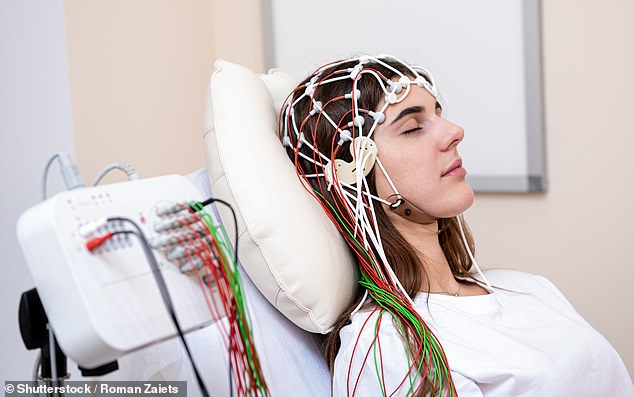Binge eating can be successfully treated with electrical brain stimulation at home, a study suggests.
The study found that in people who received the treatment, along with a training program to reduce attention to food, binge eating episodes were reduced from an average of about 20 times a month to six times a month over a period of six weeks.
People in this group also reported losing up to 4 kg (8.8 pounds) from the start of the study to the six-week follow-up.
The gentle brain stimulation technique, called transcranial direct current stimulation (tDCS), targets behavioral patterns that could be contributing to loss of control around food, allowing people to change ingrained thinking and behavior. around food.
It uses specialized equipment including a cap with attached electrodes.
Binge eating can be successfully treated with electrical brain stimulation at home, study suggests (file photo)
The brain stimulation was carried out alongside another method called attention bias modification training (ABMT), which involved computer sessions of up to 15 minutes. He trained participants to look at signs for low-calorie foods and away from signs for high-calorie foods.
Dr Michaela Flynn, research associate at the Institute of Psychiatry, Psychology and Neuroscience (IoPPN) at King’s College London and first author of the study, said: “Current treatments for binge eating disorder are only effective for some people and many need further”. or different support to recover.
“Our study is the first to look at a new home treatment option that offers a different approach to treating binge eating disorder.”
Dr Flynn added: “Participants commented that their mood felt lighter, which may be a key part of why they reported changes in eating behavior and weight loss that lasted for some time after finishing treatment.

The study found that in people who received the treatment, along with a training program to reduce attention to food, binge eating episodes were reduced from an average of about 20 times a month to six times a month over a period of six weeks.
“Our findings are encouraging and we want to explore them on a larger scale with more participants.”
Binge eating disorder (BED) is a serious mental illness that can affect anyone of any age, gender, ethnicity, or background.
People with this disorder have recurrent episodes of losing control over food intake, consuming a lot of food in a short period of time until they feel uncomfortably full.
The condition is often accompanied by anxiety and low mood and is linked to obesity and metabolic complications.

